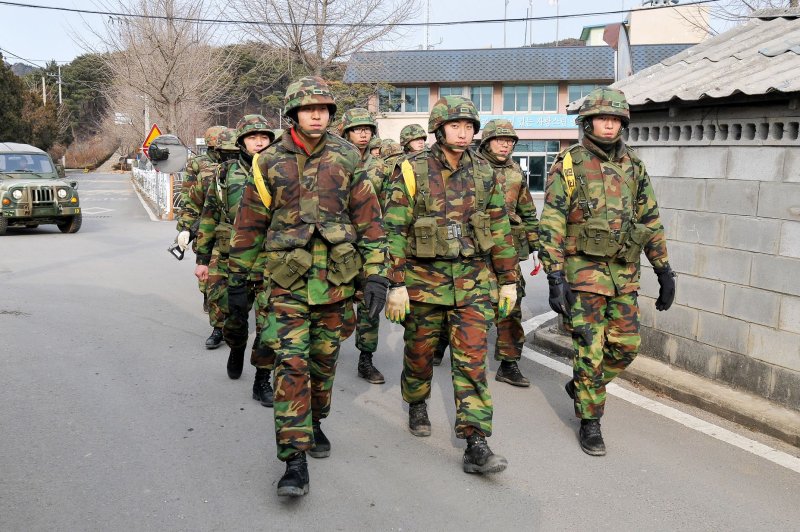South Korean Marines walk on Yeonpyeong island, South Korea after North Korea shelling in 2010. North Korea installed a steel tower on an uninhabited island near Yeonpyeong, raising concerns Pyongyang is stepping up surveillance of South Korea. UPI/Keizo Mori |
License Photo
SEOUL, Dec. 3 (UPI) -- North Korea installed a steel tower on an uninhabited island near South Korea's Yeonpyeong Island, which Pyongyang bombarded in 2010, killing four South Korean civilians.
Construction that began in early October on Ari Island appears to be complete, South Korean television network SBS reported.
A steel tower now stands 20 meters high, and a small building that appears to be lodging facilities also was completed. SBS reported any thermal imaging equipment installed on the island could capture activities on Yeonpyeong, 7.5 miles away from North Korea surveillance.
The latest buildup follows the placement of rocket launchers on the uninhabited North Korean island of Gal, which strengthens the striking power of North Korea's artillery unit.
Kim Ki-ho, a professor of security studies at Seoul's Hongik University, said the area can be seen as a "thermal [imaging] belt" and that the steel tower is connected to the rocket launchers in Pyongyang's security strategy.
North Korea's expanded surveillance in the area could pose a threat to South Korea Navy hydrofoils, or patrol boats that monitor activities in the Yellow Sea.
South Korea also has increased firepower -- installing K-9 self-propelled artillery on its side.
But Seoul's capacity to monitor North Korea is succumbing to budget cuts that are blocking military plans to install new spy satellites and more unmanned aerial vehicles, or drones.
The Defense Ministry said on Thursday the budget for reconnaissance technology has been cut by $1.7 million to about $69 million, and the new budget has been passed in the National Assembly, Yonhap reported.
South Korea's military was planning to introduce five new reconnaissance satellites by the year 2022, but with the reductions the future of those plans remain uncertain, an official said.
Seoul does plan to continue the pursuit of "Kill Chain," a local missile-defense system that includes the use of secondhand Patriot missile batteries and South Korean air-defense radars. The plan is to finish building the system by 2020.















